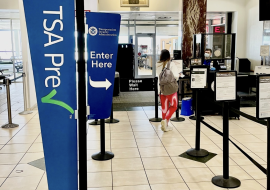The Faster Tourism Digitalizes, The Heftier Cybersecurity Might Be

Several factors such as Covid-19, demand for ‘smart’ experiences from travelers, and the development of smart cities will continue to spur the digitization of travel and tourism. The industry now needs to ensure its cybersecurity strategies can keep up with the ongoing technological evolution.
According to GlobalData, 60% of global respondents stated that they would continue (or start) to do bank transactions online or do online banking. Additionally, 47% of respondents echoed the same statement in relation to buying products online rather than visiting a store.
This accelerated shift to online purchasing created by Covid-19 and the need for more technologically advanced services has been seen in the tourism industry.
The report indicates that the market value of online travel is expected to rise substantially going forward, spurred by the pandemic. By 2025, market value is projected to reach $765.3 billion, increasing at a CAGR of 15.1% between 2021 and 2025 as travelers state their loyalty to online purchasing. This means that the amount of sensitive data that is held by travel and tourism companies will continue to grow, making them an even bigger target for cybercriminals and increasing the importance of cybersecurity.
The number of smart tourism destinations that are on the cutting-edge of technological infrastructure is continuing to grow as local and national governments look to stay ahead of the digital curve. Smart destinations help enhance touristic experiences. However, they can increase the risk of cyber attacks due to the amount of data and services that are connected to a single overarching technological ecosystem.
The personal information of a tourist is made available to multiple destination stakeholders and service providers by the technology implemented in a smart tourism destination. The smart city of Neom which is currently being built in the Tabuk Province of north-western Saudi Arabia will have to be wary of this threat. This increased availability of information could be targeted and accessed by cyber criminals if security measures are not adequate. The risk of attacks increases with smart destinations as all it takes is one device in a smart city system to not be cyber resilient.

For most travel and tourism companies and destinations, establishing partnerships with cybersecurity experts will be key going forward. Working with specialist firms that can completely focus on current and emerging security threats will allow organizations to maintain a solid defense against increasingly sophisticated attack methods.
Specialists’ sole focus on enhancing cybersecurity will ensure that their clients will not suffer from cyber attacks that can create irreversible reputational and financial damage. Hiring a specialist cybersecurity company is often a more watertight strategy. Whereas dealing with cybersecurity in-house could create holes in a company’s defense from attacks, as companies may hire, or use, employees that are not complete specialists in the area.
A large segment of the tourism industry is now looking to stay ahead of the digital curve with increased reliance on advanced technologies. As a result, cybersecurity needs to stay at the forefront of strategic importance, or breaches could occur that could have disastrous repercussions.
Source: Verdict (UK)














